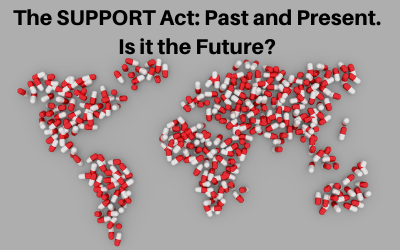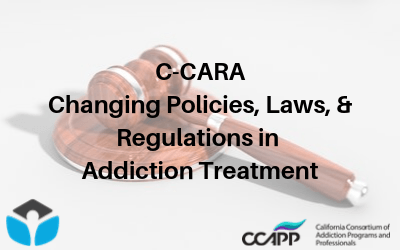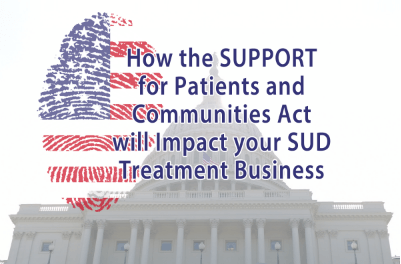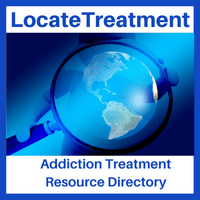Webinar: The SUPPORT Act: Past and Present. Is it the Future?

- Date Recorded: March 11, 2020
- Length: about an hour
- Presenter: Andrew Kessler
- CE: NOT eligible for CE
- Price: $0.00
The (SUPPORT) Act, passed in 2018, was hailed by some as the next great step forward in our nation's response to the opioid epidemic. Legislation and policy, however, do not take effect instantly, nor do they have an immediate impact. The wheels of change are slow, and policy changes are slower still.
The SUPPORT Act was and is a massive collection of new programs (often referred to as "pilot programs"). It offered very little in the way of systematic reform. Since in reality it is several smaller programs rolled into one piece of legislation, this makes its execution quite complex.
Each of the new programs -- whether it be aimed at prescribing practices, treatment, overdose reversal, recovery support programs, etc. -- was authorized a certain dollar amount for spending. In reality, this was only the first step of the process.
The following year, it was incumbent on Congress to allocate this funding through the appropriations process. The SUPPORT Act created 70 new funding streams, some of which received funding. Some received the amount authorized, some received less, a few even received more.
This webinar will not be able to breakdown every program and its level of funding, but we will be able to give you a very good idea of the priorities of Congress.
Already, some members of Congress think that the SUPPORT Act did not do enough and want to develop legislation that does even more. We will discuss these efforts as well, highlighting how these new efforts may supplement the SUPPORT Act, and how some efforts may create entirely new initiatives. These include the CARE Act (written by Senator Elizabeth Warren) and other legislation that is being designed to further then CARA act of 2016.
We will also take a look at the proposed budget for FY 2021, which will of course play a significant role in how successful any new programs are. Despite our many recent successes in the policy arena, behavioral health services are still woefully underfunded. We must remain dedicated to efforts that are focused and aggressive. This webinar will examine funding shortfalls we continue to experience, and how we can address them moving forward.
Finally, we will address the elephant in the room: the 2020 political situation. Unfortunately, this will take a toll on our biggest enemy, which is the calendar. A long, drawn out election and a contentious Washington are not the friends of efficiency. We will cover which deadlines might be missed, and how that may impact our success.
Legislation and therefore advocacy does not exist in a vacuum. Join us for this webinar and discover how truly fluid the policy situation is and will continue to be!
Presenter

Andrew Kessler
Andrew Kessler, JD, is founder and principal of Slingshot Solutions LLC, a consulting firm that specializes in behavioral health policy. His clients, past and present, include the International Certification and Reciprocity Consortium (IC&RC), the California Consortium of Addiction Programs & Professionals (CCAPP), and Faces and Voices of Recovery.
With 20 years of policy experience and over a decade in behavioral health, Kessler is a fixture in circles that advocate for substance abuse treatment, prevention, and research. He collaborates frequently with congressional offices, the White House Office of National Drug Control Policy, the National Institute on Drug Abuse (NIDA), the Substance Abuse and Mental Health Services Administration (SAMHSA), and other federal actors.
Kessler has written legislation and report language adopted by both the House and Senate Appropriations Committees, and has presented orally before such bodies as the Scientific Management Review Board, the National Conference on Addictive Disorders, and the College on Problems of Drug Dependence.
Related Webinars
Here are some webinars that you may find relevant to the below.

Webinar: C-CARA - Changing Policies, Laws, and Regulations in the Addiction Treatment Industry
This webinar is a great opportunity for managers, directors, administrators, and C-Suite professionals to learn more about the powerful impact of C-CARA on major issues in our industry, including patient brokering, payment reform, capacity, and workforce. During the webinar, Andrew mentioned CARA: here is a free webinar on the California version of it that was recorded in August 2017.

Webinar: How the SUPPORT for Patients and Communities Act Will Impact Your SUD Treatment Business
This webinar, recorded December 13, 2018, will inform you on the most important parts of the new law as it pertains to SUD treatment providers and how the law will potentially impact profitability and treatment offerings. This includes Section 8122 which is aimed at eliminating kickbacks in the recovery industry by imposing criminal penalties, Section 3232 which requires a special registration for telemedicine services for patients that lack access to an in-person specialist, and Section 5052 which partially repeals the restrictions for "Institutions for Mental Disease" allowing Medicare/Medicaid providers more than 16 beds to treat mental health and SUDs. $50: and BHAP members get 15% off.
Purchase/Access
In order to purchase any NBHAP webinar, you must be logged in for NBHAP and the Counselor CE Hub. Your login for both platforms is now the same, and it is free to create a login. Please contact us if you have any problems.

A national membership association that provides education and advocacy for those in the behavioral health and addiction treatment industries.
We are the leading and unifying voice of addiction-focused treatment programs.



